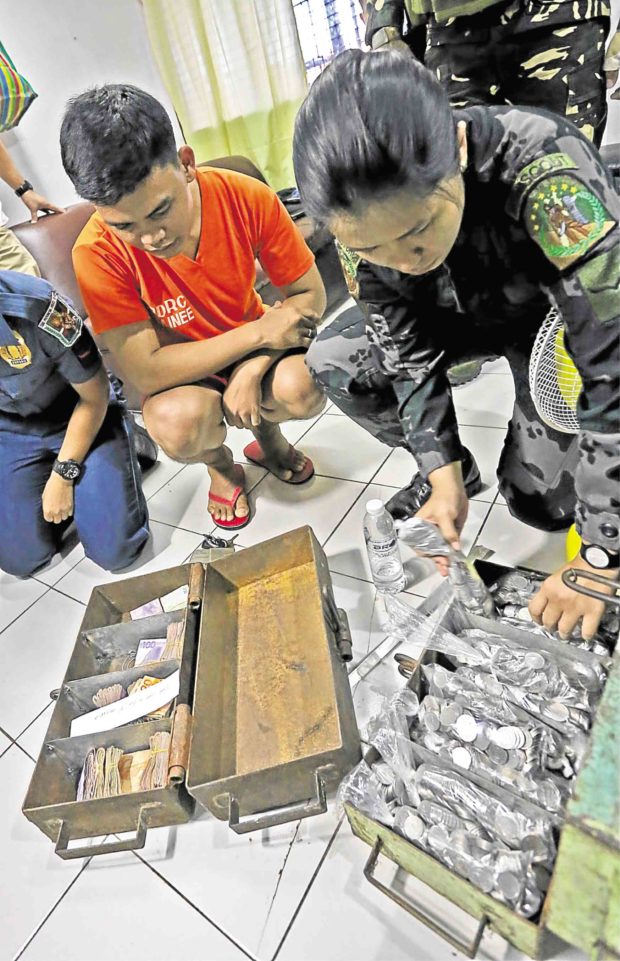
PRIORITY TASK Agents from the Cebu office of the Philippine Drug Enforcement Agency and military inventory drugs seized from the Cebu provincial jail in April.
LAPU-LAPU CITY—President Rodrigo Duterte on Thursday promised to give all-out support to village chiefs who would help in his campaign against illegal drugs, including possibly giving them firearms.
In a speech after leading the oathtaking of more than 3,000 village chiefs in Central Visayas as new members of the ruling Partido Demokratiko Pilipino-Lakas ng Bayan, Mr. Duterte said village officials should be at the front line of his war on drugs.
“You are the ones who can end this problem on narcotics,” the President said.
“We, on top, are too far,” he said.
He also gave the village chiefs an assurance that they could run to him for help if they found any obstacle in the fight against drugs.
Digong’s guns
He said he could even provide guns to village chiefs if the officials needed these to fight drugs.
Mr. Duterte said he would discuss this with acting Interior Secretary Eduardo Año because “I can’t decide on that alone.”
But he reiterated a warning to village officials involved in drugs.
The involvement of some village chiefs, the President said, was making the fight against drugs more difficult.
Mr. Duterte again mentioned Vicente Loot, mayor of Daanbantayan town, Cebu province, as a drug protector since his days as a police officer.
Loot had repeatedly denied the President’s accusation, challenging authorities to file charges against him in court so he could defend himself.
Something bad
“General Loot, either you stop your involvement [in drugs] or something bad would happen to you,” Mr. Duterte said.
The death toll in the antidrug campaign continued to rise even as police said the killings of drug suspects were results of legitimate operations.
In Central Mindanao, the regional police listed at least 78 drug-related deaths in North and South Cotabato, Sultan Kudarat and Sarangani, and the cities in those provinces since Dec. 5.
Chief Supt. Marcelo Morales, Central Mindanao police director, said all suspects slain during 811 operations in the same period had put up violent resistance.
But among the 78 fatalities were nine men being claimed by Moro Islamic Liberation Front (MILF) as members of its armed component, Bangsamoro Islamic Armed Forces (Biaf), who MILF members said were killed in a massacre.
Witnesses present
The MILF said the nine Biaf members were executed and did not put up a fight during antidrug operations on May 25 and 26.
“All operations that ended bloody were legitimate,” Morales told reporters on Tuesday.
“Witnesses were present,” he said.
He said the arrests of 893 suspects, 759 for pushing, would show that police were not on a killing spree as critics claimed.
“We respect life as much as we value human rights,” Morales said. “However, there are still those who refuse to submit themselves to change,” he added.
Since Dec. 5, Morales said operations launched jointly by police, the Philippine Drug Enforcement Agency and the military led to the seizure of 1,731 grams of “shabu” (crystal meth), 11 firearms and 25 explosives.
Morales said police kept the door open for those who wanted to surrender.
“Giving up could save not just one’s life but of other people,” Morales said.
Rehab phase
Health authorities in South Cotabato said they were doing their part in the campaign against drugs.
On Monday, 783 drug dependents in the province graduated from a six-month rehab program.
Dr. Rogelio Aturdido Jr., South Cotabato health chief, said the 783 were among 1,055 drug dependents who surrendered during “Oplan Tokhang” starting in 2016.
The Catholic Church in Koronadal was also carrying out a rehab program for drug addicts.
Valme Mariveles, spokesperson for the Diocese of Marbel, said the diocese currently had 187 drug dependents in its care.
Mariveles said some of the reformed addicts were now active in Church programs. “They now live normal lives and are closer to God,” she said. —REPORTS FROM ROSALIE O. ATABAYO AND EDWIN FERNANDEZ